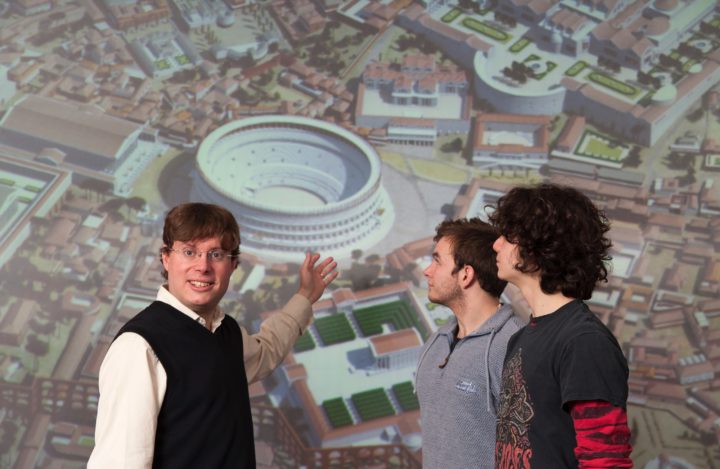Ancient Rome has come alive thanks to the work of Dr Matthew Nicholls and his creation of the world’s most detailed digital model of the ‘Eternal City’.
Virtual Rome, a digital modelling project involving undergraduate and postgraduate students, is now an important part of the teaching and research life of the Department of Classics. Springing from Dr Nicholls’ lifelong interest in Rome, Virtual Rome’s 3D historically accurate digital model can generate fly-throughs, animations, live interactive models to explore, and 360 degree panoramic images. It can be used in a huge variety of teaching, outreach, and impact contexts.
Virtual Rome was popularised by an innovative Massive Open Online Course (MOOC) on the FutureLearn platform, which allowed users to move seamlessly between the model and real-life film footage of contemporary Rome. Featuring the world’s first live deployment of 3D user-manipulable content within a MOOC, it attracted thousands of learners globally, and was named by ClassCentral as one of the top ten most popular MOOCs worldwide in March 2017. Virtual Rome also won first place in the Guardian and Higher Education Academy’s University Awards 2014, while Dr Nicholls is also a British Academy Rising Star Engagement Award winner, working on digital visualisations with industry and heritage sector partners.
The project has been disseminated by blogs, workshops, videos, media appearances, commercial licensing and best-selling books.
It is helping to popularise Classics, illustrate the educative benefits of knowledge of the ancient world, contribute to pedagogical innovation and provide humanities students with transferable skills. Overall, Dr Nicholls’ work has reached millions of people worldwide.
Shortlisted for the University Research Engagement and Impact Awards 2017
First published: June 2017

